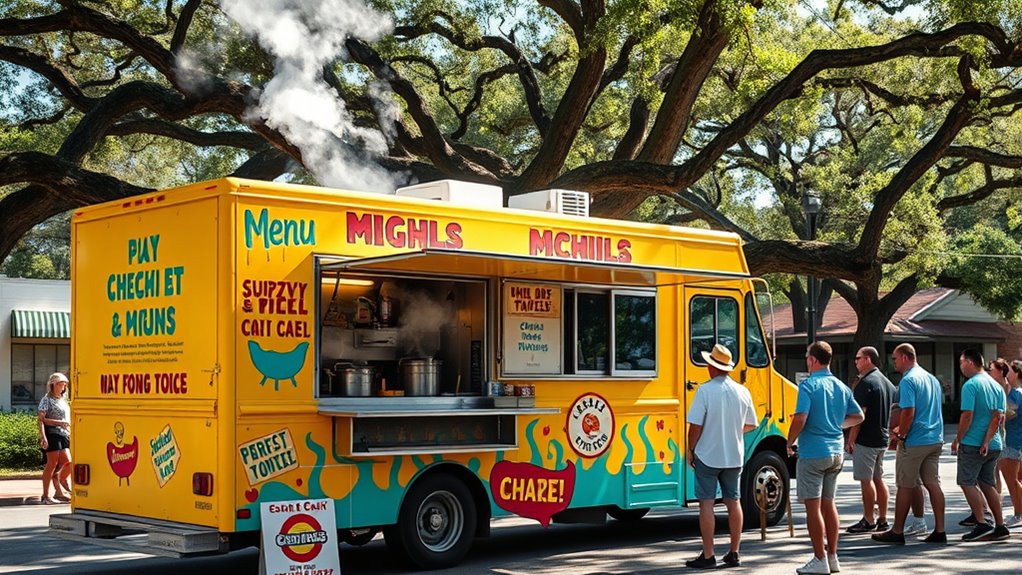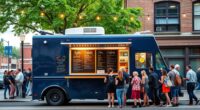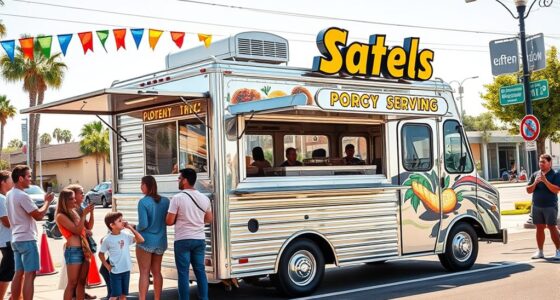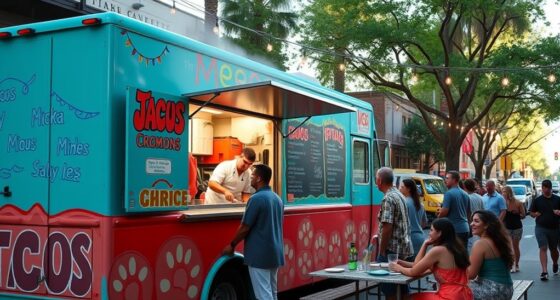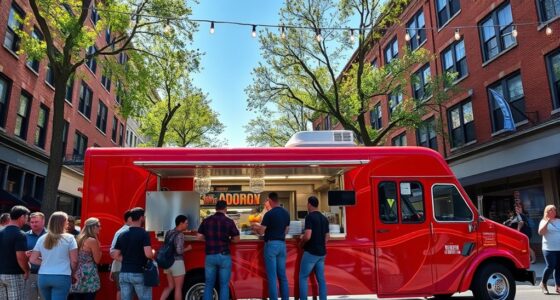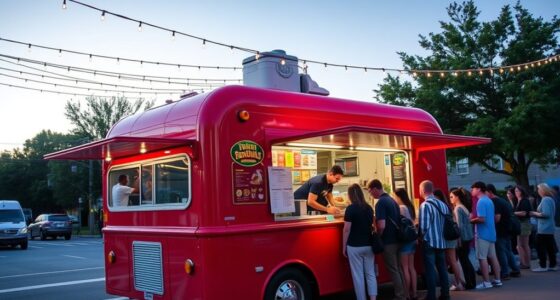To start a food truck in Baton Rouge, you’ll need to get the necessary permits, meet health and safety regulations, and secure the right equipment within your budget. Focus on designing a menu that highlights local flavors and develops a strong brand through social media and festival involvement. Building relationships with community events and using technology for efficient service will boost your success. Keep exploring to discover more tips on launching your food truck journey.
Key Takeaways
- Obtain necessary permits, licenses, and insurance by applying through local health and city departments.
- Budget $20,000–$50,000 for equipment, vehicle costs, permits, and initial inventory.
- Develop a Baton Rouge-inspired menu with regional ingredients and clear categories for efficient operations.
- Follow sanitation standards, health inspections, and street parking regulations to ensure compliance.
- Leverage social media and festival participation to build community presence, attract customers, and grow your brand.
Vibrant Baton Rouge Food Scene
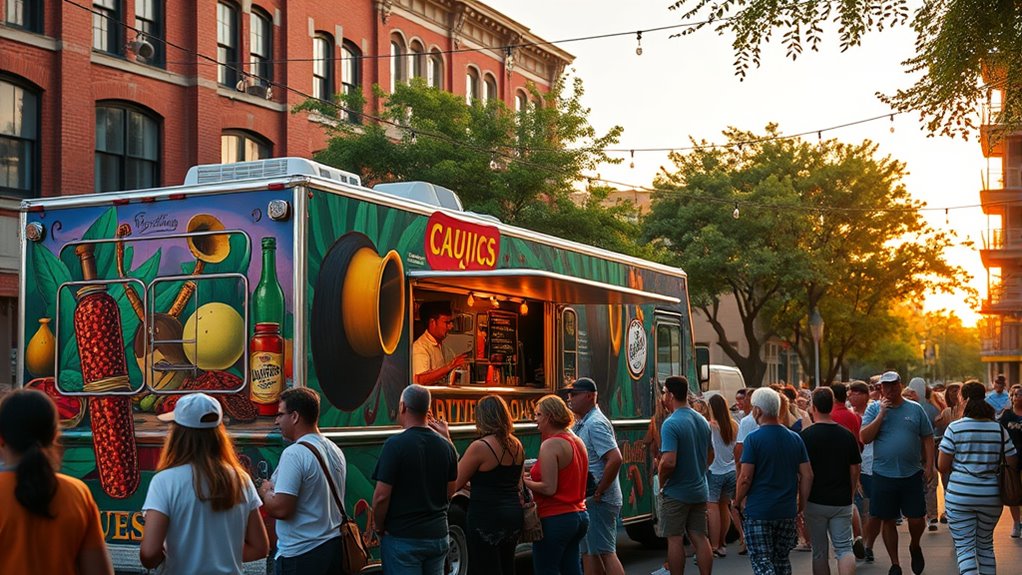
Have you ever wondered what makes Baton Rouge’s food scene so lively? It’s the dynamic mix of diverse flavors and passionate vendors that draw in crowds. Food truck branding plays a pivotal role here, helping your truck stand out amid the bustling scene. Strong branding creates a memorable identity, encouraging customer loyalty as people recognize and return for your unique offerings. Baton Rouge residents love supporting local businesses, especially when they feel a connection to a truck’s story or style. By consistently delivering quality food and a compelling brand image, you can turn first-time visitors into loyal customers. This vibrant environment rewards those who understand how to foster relationships and make their food truck a staple in the community. Forsale 100
Understanding Local Requirements
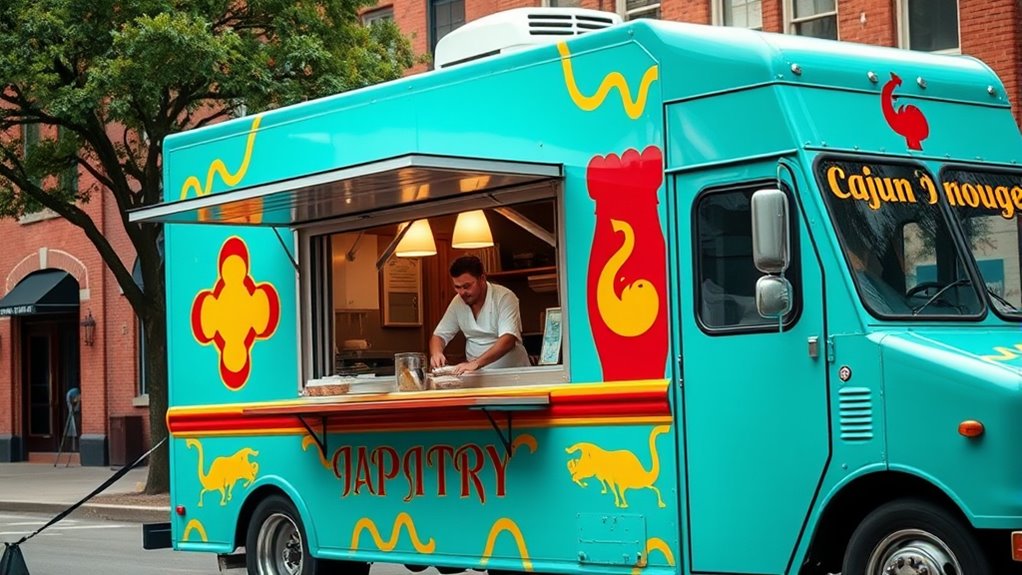
To operate your food truck in Baton Rouge, you need to understand the local requirements. This includes steering the permit application process, paying applicable fees, and meeting sanitation standards. You’ll also want to know where you can park legally on designated street zones. Additionally, familiarize yourself with health and safety regulations to ensure compliance with local food service laws and best practices.
Permits: Application Process and Fees
Wondering what it takes to get your food truck on the streets of Baton Rouge? First, you’ll need to obtain the necessary food truck permits, which involve submitting applications to local health and city departments. The application process typically includes providing proof of insurance, vehicle registration, and passing health inspections. Be prepared to pay license fees that vary depending on your truck’s size and services. These fees cover permit issuance and ongoing compliance. Make sure to review the specific requirements outlined by the Baton Rouge city government to avoid delays. Completing the application accurately and paying the fees promptly will help you secure your permits faster. Once approved, you’ll be ready to hit the streets and start serving your delicious food.
Sanitation Protocols and Documentation
Understanding local sanitation protocols is essential for keeping your food truck compliant and ensuring customer safety. Baton Rouge requires strict adherence to hand hygiene practices and documented cleaning schedules. You must regularly sanitize surfaces, wash hands thoroughly, and log these activities to meet health department standards. Proper documentation proves you follow sanitation protocols and can prevent violations. Here’s a quick overview:
| Requirement | Details |
|---|---|
| Hand Hygiene | Wash hands frequently, use gloves when needed |
| Cleaning Schedules | Log daily cleaning and sanitation routines |
| Surface Sanitization | Disinfect prep areas and equipment regularly |
| Staff Training | Educate staff on sanitation protocols |
| Inspection Readiness | Keep records accessible for inspections |
Staying compliant with these protocols helps maintain a safe environment and avoids fines.
Designated Street Parking Zones
Finding your way through Baton Rouge’s street parking regulations is crucial for operating your food truck smoothly and avoiding fines. Local parking regulations often specify designated street parking zones where food trucks can legally park. These zones are typically marked by clear street signage indicating parking hours, restrictions, and any special permits required. It’s essential to pay close attention to these signs to ensure you’re parked legally. Some areas may have restrictions during peak hours or special events, so always verify the details on street signage before parking. By understanding and complying with these designated zones, you reduce the risk of citations and keep your operations running without interruption. Familiarize yourself with the street signage to navigate parking regulations confidently and legally.
Setting Up Your Base of Operations
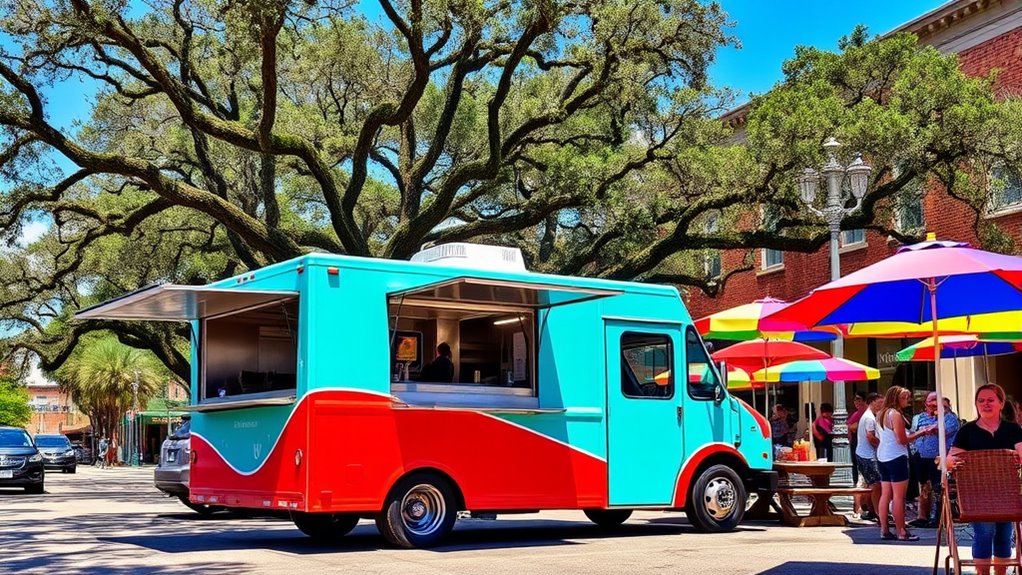
Choosing the right shared kitchen licensing options can save you time and meet local regulations efficiently. You’ll also want to select custom kitchen equipment that fits your menu and workflow. Let’s explore how to set up a solid base of operations for your food truck in Baton Rouge.
Shared Kitchen Licensing Options
Setting up your food truck’s base of operations often involves exploring shared kitchen licensing options, which can offer a cost-effective and flexible solution. With shared kitchen licensing, you can operate in a co-working kitchen that meets local co working kitchen regulations, saving you from building your own commercial space. These shared kitchens are licensed for food production and often come equipped with necessary appliances and sanitation facilities. They’re ideal for startups or small-scale operations, providing a compliant environment without high overhead costs. By utilizing shared kitchen licensing, you can focus on perfecting your menu and marketing your food truck, knowing your base of operations adheres to health and safety standards. This approach simplifies compliance while giving you room to grow.
Custom Kitchen Equipment Selection
After securing a shared kitchen license, the next step is selecting the right equipment to outfit your food truck’s operations. Your chosen kitchen layout will influence which appliances and tools fit best, ensuring efficient workflow. Focus on durable, commercial-grade equipment that can withstand daily use and simplify maintenance. Consider essential items like grills, fryers, prep tables, and refrigeration units, all aligned with your menu needs. Proper equipment maintenance is vital; choose models with accessible parts and reliable support to minimize downtime. Think about space-saving designs to maximize your truck’s interior. A well-thought-out selection streamlines your process, reduces operational hiccups, and keeps your kitchen running smoothly. Prioritize quality and practicality to build a solid foundation for your food truck business.
Budgeting and Financing Your Food Truck
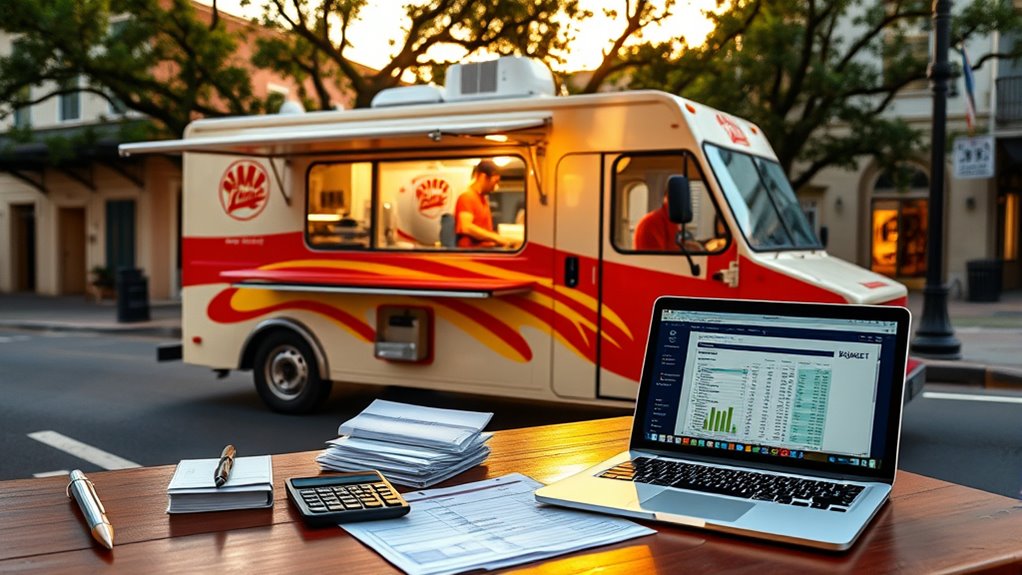
To start your food truck journey, you need to plan for initial equipment costs and how you’ll finance them. Local small business loans can provide the funds you need, but don’t forget to account for liability coverage to protect your investment. Being clear on these points helps ensure your truck gets rolling without unexpected financial setbacks. Additionally, understanding the costs associated with starting a food truck can help you create a more accurate budget and avoid surprises.
Initial Equipment Purchase Costs
Budgeting for your food truck’s initial equipment is a crucial step that can considerably impact your startup costs. Equipment costs typically include a commercial-grade oven, refrigerator, cooking equipment, and point-of-sale systems. These expenses are essential for ensuring your truck is fully operational and meets health standards. On average, you should plan to spend between $20,000 and $50,000 on equipment, depending on your menu and truck size. Keep in mind, these startup expenses also cover necessary tools, utensils, and safety equipment. Investing wisely now can save you money in the long run and prevent costly upgrades later. Carefully researching and comparing prices helps you stay within budget while acquiring quality equipment that will serve your business well.
Local Small Business Loans
Securing the right financing options can make or break your food truck startup. Small business loans are a crucial tool to cover upfront costs like equipment, permits, and initial inventory. To access these loans, you’ll need solid financial planning to demonstrate your business’s potential and repayment ability. Research local lenders in Baton Rouge that specialize in small business financing, including banks and credit unions, as they often offer favorable terms. Consider government-backed options like SBA loans, which can provide lower interest rates and longer repayment periods. Before applying, prepare a detailed business plan, financial statements, and proof of income. Proper planning and leveraging local small business loans give you the financial foundation to launch confidently and sustain your food truck’s growth.
Liability Coverage for Food Trucks
Are you aware of how essential liability coverage is when financing your food truck? Liability insurance protects you from potential lawsuits and financial losses caused by accidents, injuries, or property damage during operations. Without proper coverage options, a single mishap could threaten your entire business. When selecting liability insurance, consider coverage limits that meet Louisiana’s requirements and suit your specific needs. It’s important to understand what your policy covers, including bodily injury, property damage, and legal costs. Investing in comprehensive liability coverage not only safeguards your assets but also builds trust with customers and vendors. Remember, having adequate liability insurance is a key step in securing financing and ensuring long-term success for your Baton Rouge food truck.
Designing Your Menu and Pricing Strategy
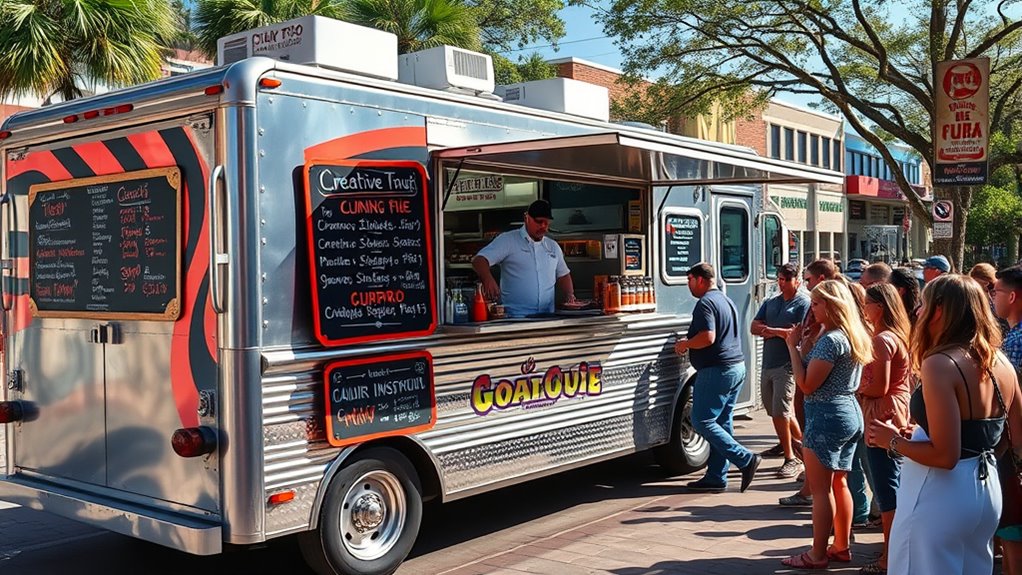
When designing your menu, focus on incorporating locally inspired dishes that resonate with Baton Rouge’s flavors. Keep your costs in check by carefully balancing ingredient prices and portion sizes to safeguard your profit margins. A well-thought-out pricing strategy ensures your menu remains competitive while maximizing revenue. Additionally, applying evidence-based strategies can help you optimize your pricing and menu design for long-term success.
Locally Inspired Dish Curation
Creating a menu that reflects Baton Rouge’s vibrant local flavors starts with carefully selecting dishes that highlight regional ingredients and culinary traditions. Focus on locally inspired, dish curation to showcase staples like fresh seafood, Cajun spices, and Southern comfort foods. This approach not only appeals to locals but also attracts tourists enthusiastic to taste authentic Baton Rouge cuisine. To organize your offerings, consider this sample menu:
| Appetizers | Main Courses |
|---|---|
| Crawfish Boudin Balls | Shrimp and Grits |
| Sweet Potato Fries | Po’ Boy Sandwiches |
| Cajun Gumbo | Fried Catfish with Dirty Rice |
Cost Control and Menu Margins
Designing your menu and pricing strategy around cost control guarantees your food truck remains profitable while offering appealing dishes. Focus on cost efficiency by selecting ingredients that deliver high flavor without overspending. Price your menu items to ensure healthy profit margins, balancing affordability with profitability. Streamline offerings by removing low-margin items and emphasizing dishes with higher menu profitability. Keep portion sizes consistent to control costs and prevent waste. Use data on ingredient costs and sales patterns to adjust prices regularly, maintaining a balance between competitiveness and profit. Remember, a well-structured menu with wise pricing enhances your overall profitability and sustains your food truck’s success in Baton Rouge. Prioritizing cost control helps you maximize revenue while delighting customers with quality food.
Technology and Operations

You can make transactions faster and safer by offering contactless payment options. Using a mobile POS system helps you manage orders and sales on the go, keeping your operations smooth. Additionally, stock tracking tools guarantee you stay on top of inventory levels, preventing shortages and waste. Incorporating precious metals investment knowledge can help you understand the importance of diversifying your business assets for better financial security.
Contactless Payment Options Available
To enhance convenience and safety, many food trucks in Baton Rouge now offer contactless payment options. With contactless payment, customers can pay quickly using their smartphone or contactless credit cards, reducing wait times and minimizing physical contact. Mobile payment systems like Apple Pay, Google Pay, and Samsung Pay are popular choices, making transactions seamless and secure. Implementing these options not only improves customer experience but also streamlines your operations. Customers appreciate the flexibility and safety of paying without cash or PIN entry. As a food truck owner, adopting contactless payment methods helps you stay competitive and meet modern expectations for hygiene and convenience. Make sure your point-of-sale system supports contactless transactions to maximize efficiency and customer satisfaction.
Mobile POS and Stock Tracking
Implementing a mobile POS system can substantially streamline your food truck’s operations by enabling quick and flexible sales processing from anywhere on your route. With mobile POS, you gain real-time sales data, making it easier to monitor performance and boost customer satisfaction. Stock tracking becomes effortless, helping you avoid shortages and excess inventory. Here are four ways this technology impacts your business:
- Boosts efficiency, reducing wait times and increasing sales.
- Keeps you informed about stock levels, preventing shortages.
- Simplifies accounting with integrated sales data.
- Enhances customer experience with fast, seamless transactions.
Marketing and Growing Your Presence
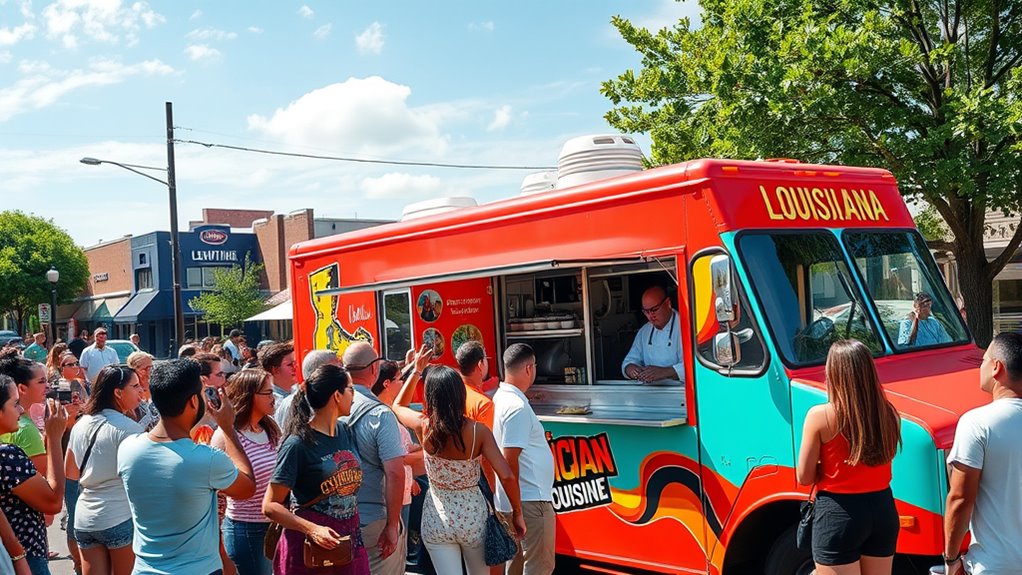
Participating in popular food truck events can boost your visibility and attract new customers. Posting engaging, high-quality food photos on Instagram helps create buzz and builds a loyal following. These strategies can considerably grow your presence in Baton Rouge’s vibrant food scene.
Popular Food Truck Events
Attending popular food truck events is one of the most effective ways to boost your visibility and attract new customers. These events give you a platform to showcase your food truck branding and demonstrate menu innovation. To stand out, focus on:
- Engaging with the crowd and sharing your story.
- Offering limited-time menu items that excite and surprise.
- Creating eye-catching signage and branding that’s memorable.
- Building relationships with other vendors and event organizers.
Engaging Instagram Foodie Photos
Since eye-catching Instagram foodie photos are key to growing your food truck’s online presence, focus on capturing vibrant, well-lit images that showcase your dishes at their best. Use food photography tips like natural lighting, clean backgrounds, and appealing angles to make your dishes pop. Pay attention to composition to highlight textures and colors that make viewers crave your food. Incorporate props, garnishes, and diverse plating styles to add visual interest. To boost your Instagram engagement strategies, post consistently and use relevant hashtags to reach local food lovers. Engage with followers by responding to comments and encouraging user-generated content. Remember, high-quality, enticing images will attract more followers, increase visits, and turn your Instagram account into a powerful marketing tool for your Baton Rouge food truck.
Master Local Food Festivals

To truly experience Baton Rouge’s vibrant food scene, you should immerse yourself in its local food festivals, which showcase the city’s diverse culinary talents. Participating in these festivals connects you with passionate chefs, local farmers, and festival partnerships that celebrate Louisiana’s flavors.
Discover Baton Rouge’s rich culinary scene by engaging in local food festivals and connecting with passionate chefs and farmers.
Here are four ways mastering these festivals can boost your food truck business:
- Build strong relationships with festival organizers for prime booth placements.
- Gain exposure to large crowds enthusiastic to try new foods.
- Collaborate with other vendors to create unique culinary experiences.
- Strengthen your reputation as a local favorite, encouraging repeat customers.
Engaging in local food festivals isn’t just about selling; it’s about becoming part of Baton Rouge’s rich food culture. This approach positions your food truck for long-term success.
Frequently Asked Questions
What Are the Best Locations to Park My Food Truck in Baton Rouge?
You should focus on food truck parking at Baton Rouge hotspots like LSU football games, downtown festivals, and local farmers markets. These busy areas attract big crowds, boosting your sales. Look for permits and designated spots ahead of time to avoid issues. Parking near office parks and busy street corners can also draw steady lunch crowds. Keep an eye on local events for the best food truck parking opportunities in Baton Rouge.
How Do I Find Reliable Suppliers for Ingredients in Baton Rouge?
To find reliable suppliers for ingredients in Baton Rouge, you need to research local markets, visit wholesale vendors, and build strong relationships. Look for vendors with consistent quality, fair prices, and timely delivery. Network with other food truck owners, attend farmers’ markets, and check online reviews. By staying proactive and engaged, you’ll secure dependable sources, ensuring fresh ingredients and smooth operations for your food truck business.
What Permits Are Needed for Catering Events in Baton Rouge?
You need to obtain an event permit from the Baton Rouge city or parish authorities to cater events. Make sure your food truck complies with local food safety regulations, including proper sanitation and health inspections. You might also need specific permits for each event, depending on its size and location. Always check with local government offices to confirm the exact requirements, so you stay compliant and avoid fines.
How Can I Build a Loyal Customer Base Quickly?
You can build a loyal customer base quickly by leveraging social media marketing to showcase your daily specials and engaging with local communities. Offer loyalty programs that reward repeat customers with discounts or freebies, encouraging them to return often. Consistently posting updates, responding to reviews, and creating special promotions will foster relationships and keep your food truck top of mind for locals looking for delicious, convenient options.
Are There Any Specific Health Regulations Unique to Baton Rouge?
Think of Baton Rouge’s health regulations as a well-guarded recipe, essential for your success. You must follow local health codes diligently and obtain food safety certifications to keep your truck running smoothly. While the rules align with Louisiana standards, staying updated on any specific local ordinances guarantees you won’t hit a sour note. By adhering to these guidelines, you’ll serve up delicious food safely and earn your customers’ trust effortlessly.
Conclusion
Starting a food truck in Baton Rouge can be a rewarding venture if you embrace the local spirit and stay prepared. Remember, “Luck favors the prepared,” so research, plan, and stay flexible. With passion and dedication, you’ll turn your food truck into a beloved part of Baton Rouge’s vibrant food scene. Keep your eyes on the prize and enjoy every step of the journey—success often comes to those who start with purpose and perseverance.
